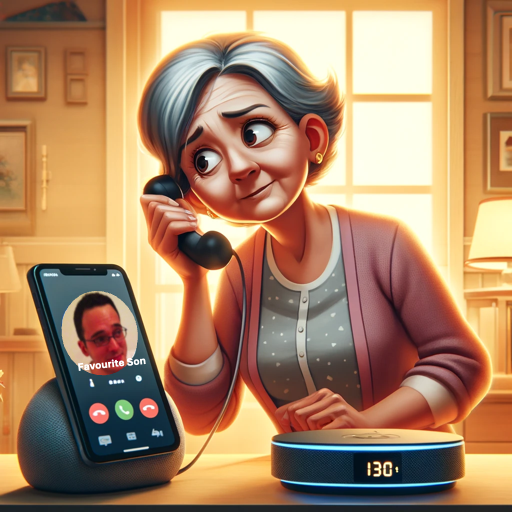Fighting lockdown with tech...and fighting with tech
Cartoon of older adult woman on the phone with an incoming video call from her 'Favourite Son' on a smart device.
Four years ago, we were one month into the first COVID-19 lockdown in the UK. My wife and I were so confused by the situation and how we were going to juggle work and childcare, it was difficult to properly consider Mum’s needs. It was before her diagnosis, and I don’t recall having major concerns about her ability to look after herself from a practical standpoint. She had mild memory issues, but was perfectly capable of self-care. The lockdown, however, appears to have been the catalyst that accelerated Mum’s difficulties, and I did not fully grasp the mental health implications of her living alone.
I have no idea what Mum did during those first months of lockdown. We spoke on the phone regularly, but the conversations were not rich (neither of us were doing anything exciting enough to talk about!). When things opened up in the summer of 2020, I installed a video-enabled Alexa at Mum’s house to provide some visual interaction. I think we managed to use it twice. Mum couldn’t remember the ‘Alexa’ wake-up command. Whenever I phoned her, I would also start a video call on the Alexa and guide her through how to join the call. She had real difficulty repeating the wake-up phrases I told her in the correct order and couldn’t figure out how to put me on speakerphone. She would get frustrated but she’s never been one to take things too seriously and we’d end up joking about it.
My siblings and I now regret not taking the risk to visit Mum during that period (to ‘test our eyesight’). Each time we did see her, we were able to visibly cheer her up by poking fun, take the kids to feed the ducks with her, and all that good family stuff. Living through that time was difficult for everyone, but Mum was alone, in the early stages of dementia - she’s a hero for getting through it.
We strongly believe the isolation from the various lockdowns hastened Mum’s symptoms, but we lack a counterfactual. I’ve since discovered some small studies that were published during the early pandemic period and afterward. Indeed, one study concludes that individuals with ‘mild cognitive decline’ or ‘subjective cognitive decline’—pre-dementia stages where Mum was at the start of the pandemic—exhibited faster declines in memory and delayed recall compared to controls [https://alzres.biomedcentral.com/articles/10.1186/s13195-023-01226-5].
Lockdown did manage to foster greater empathy for people living alone in isolation. I attended a recent panel at the Alzheimer’s Disease International conference, where a panellist, Eric Kihlstrom, put it nicely: ‘[following the pandemic] the world understands what it's like to be isolated at home alone’. Now, there is a greater recognition of the support that individuals like Mum require to maintain their independence at home and live a stimulating life.
The COVID-19 situation compounded the challenges of providing remote care. As a result, a number of solutions were deployed. Notably, telehealth systems were provided to vulnerable older adults in the UK to enable family members and healthcare professionals to remotely check in on them. However, I do not believe that these solutions were designed with people with dementia in mind. There are a number of symptoms associated with dementia that make general technology for older adults unsuitable - see above experience with voice-activated devices.
The Longitude Prize on Dementia has afforded us, and a number of other teams, the time and funding to prioritise co-creation with people living with dementia in product development. This initiative will change the situation in the coming years by giving people with dementia a voice in the crowded and complex assistive technology market.

